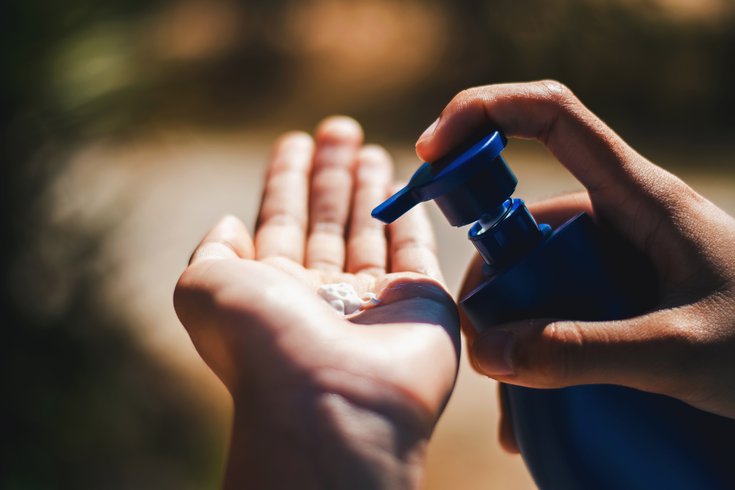
June 29, 2022
 Source/Image licensed from Ingram Image
Source/Image licensed from Ingram Image
For the best skin protection, sunscreen with SPF 30 or higher is recommended. Dermatologists also recommend people use 'broad-spectrum' sunscreen. These products protect against UVA and UVB rays.
Summer brings longer days and more time outdoors in the sun.
Applying sunscreen is important all year round, but extra diligence is needed to protect the skin during the summer months, dermatologists say. Because of time spent at pools, water parks and the beach during the warmer weather, sunscreen should be reapplied often when swimming or sweating a lot.
"SPF should be applied every day to areas that are exposed — which often includes the face, neck, chest, ears and hands — and it is especially important to reapply every two hours, or sooner if swimming or sweating, as people spend more time outdoors in the summer months," Dr. Marisa Garshick, a New York City dermatologist, told InStyle.
The hot temperatures, humidity and extra sun exposure can lead to sweat-induced clogged pores, sunburn and dark spots. There is also an increased risk of skin cancer. Most skin cancers are caused by too much exposure to ultraviolet light. UV rays can damage skin cells and come not only from the sun, but also tanning beds and sunlamps.
Here are some other tips for healthy skin care this summer from InStyle, Prevention and Healthline:
When applying sunscreen to the face and neck, dermatologists advise people to follow the two-finger method. This means applying a strip of sunscreen to the index and middle fingers and then rubbing it into the face and neck. When applying it to the body though, people need an amount that would fill a shot glass.
And don't forget to protect the lips. Skin cancer often can surface there. There are certain sunscreens designed to be safely used on the lips.
SPF measures how much UV radiation is required to produce sunburn on protected skin. For the best protection, sunscreen with SPF 30 or higher is recommended. Also look for "broad-spectrum" sunscreen. This mean it protects skin from both UVA and UVB rays.
UV rays are the most powerful between 10 a.m. and 4 p.m. so it is best to limit time outside during these hours. This isn't always practical though, so experts advise people to seek shade so they are not in direct sunlight and to wear clothing with an ultraviolet protection factor of at least 50, in addition to sunscreen.
Clogged pores are more of an issue during the summer months and they can lead to acne breakouts. The best to way to prevent sweat and oil from building up in the pores is to use non-comedogenic skincare and makeup products. Stick to these products during the summer months and avoid those meant for deep moisturizing or oily formulations.
Washing your face is important all year round — the rule of thumb is to wash it twice a day. But during the summer months, people should be extra diligent with their skincare. When washing, make sure to clean up into the hairline and the outer edges of the face, where breakouts are most likely to occur. Face washes that include benzoyl peroxide and salicylic acid can help unclog pores and kill of acne-producing bacteria.
People don't need as much moisturizer as they do in the dryer winter months. But it is still important to apply a light moisturizer because the combination of the sun and water can still dry out the skin.
Dr. Elizabeth Mullans, a board certified dermatologist, told Healthline that people should sample different moisturizers so they can find the right one. Those of a runnier consistency are lighter moisturizers, she explained. Look for products that are tinted, at least SPF 30 and are lightweight.
She cautioned that if people who use moisturizers with an SPF 30 still need to reapply sunscreen when out in the sun.
Dermatologists advise people not to wear so much makeup that it clogs their pores when they sweat. They also recommend choosing SPF products if people don't already do this throughout the year.
Exfoliating is important for unclogging pores and reducing blemishes, but it is not a good idea for people to exfoliate when they are sunburned. It is best to let the skin heal on its own. In the summer, it is OK to exfoliate more than during the winter, but never more than once or twice a month. Choose extra gentle products, experts say.